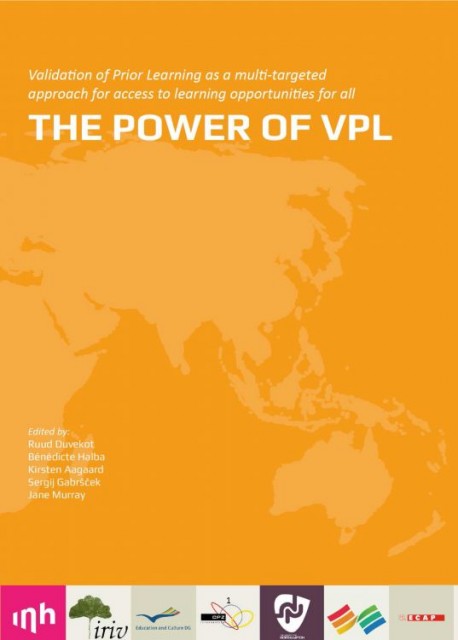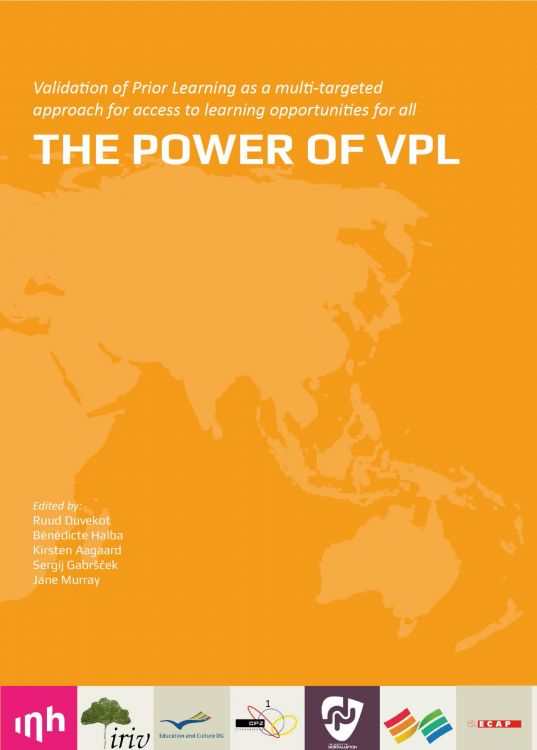Observatorio de la validación de competencias
By accepting you will be accessing a service provided by a third-party external to https://observal.es/
The Power of VPL: Validation of Prior Learning as a multi-targeted approach for access to learning opportunities for all
Learning is more than ever important and valuable, people are encouraged to invest in their potential throughout their lives, taking into account their prior learning. According to policy papers all across the globe, this should concern all citizens, including the underrepresented groups and non-traditional learners with regard to higher education because everywhere the knowledge-economy needs more higher-educated participation from all.
The European agenda on 'the Social Dimension of Education and Training' states that:
recognising prior learning and providing individualised support enhances participation of underrepresented groups and non-traditional learners in higher education (HE).
The strategic framework for European cooperation in education and training (ET2020) supports this. However, HE-institutions are still considering how to offer/support lifelong learning perspectives and making use of the added value of methods for Validation of Prior Learning (VPL).
Some universities develop VPL-practices as an answer to economic and labour market needs; others use VPL as a way to widen access and participation of target groups which are obstructed in getting access to HE. Reality therefore calls for action on making HE more accessible for underrepresented groups and non-traditional learners by focusing on flexible lifelong learning-strategies, opened up by tailor-made VPL-approaches.
The crucial question for the consortium ALLinHE was how to further develop and implement VPL as an effective method in higher education, being able to integrate the selected target groups effectively and quality-assured into lifelong learning at HE-levels? This question related to several national priority areas linked to VPL and the question of accessibility of HE:
a) further developing and implementing existing national legislation on VPL-enhanced lifelong learning in the learning domain, especially of HE.
b) shifting from national projects on integrating VPL in tertiary education-levels to practical implementation.
c) organising the levels of professionalism in HE to be able to cope with customer-steered and competence-based lifelong learning, like functions of guidance, individualised and flexible teaching/learning, managing flexibilised programmes.
d) opening up HE for all citizens with a special focus on underrepresented groups and non-traditional learners for the sake of opening learning chances for all. With this question in mind, the consortium ALLinHE linked the issues of underrepresentation of specific target groups and the lack of practical VPL-approaches to a focus on widening access to HE and/or recognition at HE-levels within the sub-action "ERASMUS social inclusion in higher education". Investigating these issues
In Europe and Asia (South Korea) resulted in an overview showing the diversity of target groups to work on for creating solutions for social inclusion, more specifically migrants, refugees, elderly (50+), ethnic minorities and special needs groups.
The consortium established that there is within existing VPL-methodology a need for a more multi-targeted approach based on the diversity of learner's needs and social-economic opportunities on education-levels across the globe. In the project it became clear that VPL isn't yet fully operational as a multi-targeted approach for:
- personalised VPL, with divergent use of qualification-standards, based on all learning outcomes of the individual; for personal diagnostics, guidance and career-advice,
- summative VPL, with convergent use of various standards within qualification-related contexts, showing the most efficient way to a (HE-)qualification for the target groups.
- formative VPL, with convergent use of qualification-standards within job-specific contexts, especially showing the HE-level of prior learning outcomes and the possibilities for updating/upgrading within HE,
The book 'The Power of VPL' is both result of the project ALLinHE as well as an agenda for further exploring and paving the way for VPL, not only in higher education but also in other qualification-levels and – even better – in contexts of work, volunteering, citizenship, inclusion-activities and leisure.
With this book, the aim is to show that lifelong learning is possible in any context, country and culture, and that there are always shared elements that make it possible to make a manageable tool for lifelong learning out of the methodology of VPL. Why this is so relevant and of value to the citizens and their organisations across the globe is explained in the variety of approaches, practices and visions, presented in this book.
Índice del libro
- Breaking ground for Validation of Prior Learning in lifelong learning strategies by Ruud Duvekot
- Experience as the basis of eligibility for higher education by Per Andersson
- RPL/VPL Practices in the Academic Credit Bank System of South Korea by Hae Young Lee & Young Sang Ko
- Integrated solutions for adult learning professionals to access master level by Simona Sava, Claudia Borca & Elena Danciu
- The Nordic Network for Adult Learning (NVL) and the promotion of VPL: The role of networks in enhancing VPL as an access tool to learning opportunities and addressing challenges in the Nordic region by Antra Carlsen
- Validation for empowerment and participation in 'the learning society' The potential of the UNESCO Guidelines for the recognition, validation and accreditation of the outcomes of non-formal and informal learning by Madhu Singh
- A UK Perspective on Validated Prior Learning Validated Prior Learning as an instrument for access to higher education by two marginalised groups by Jane Murray
- Multidimensional and multi-target approach to VPL in Switzerland Valuing learning and competences of qualified immigrant women: three case studies by Furio Bednarz & Giovanna Bednarz
- From Confusion to Clarity: Personal perspectives on Validation of Prior Learning (VPL) in the context of Finnish higher education by Aino Lepänjuuri and Eila Burns
- Meeting points in the VPL process – a key challenge for VPL activities by Ellen Enggaard and Kirsten Aagaard
- Supporting migrants in the process of Validation of Prior learning: A French perspective by Bénédicte Halba
- The case of VPL and industry focused programmes in Cork Institute of Technology by Deirdre Goggin, Irene Sheridan and Tim Horgan
- Experiences with Validation of Prior Learning in higher education in Norway: Developing guidelines for VPL towards exemptions in higher education by Camilla Alfsen
- Still hiding for the bottom-up approach: The Netherlands: a case of VPL in itself by Ruud Duvekot
Referencia
Duvekot, R., Halba, B., Aagaard, K., Gabršček, S. & Murray, J. (2014). The Power of VPL: Validation of Prior Learning as a multi-targeted approach for access to learning opportunities for all. Rotterdam: Inholland University AS & European Centre Valuation Prior Learning,


